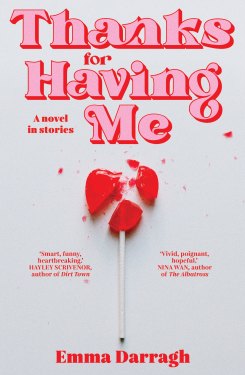Thanks for Having Me
Emma Darragh, Joan, $32.99
A chaotic narrative that jumps through three generations of women in one family, Thanks for Having Me sees two of the main characters rebel against the social strictures and expectations of motherhood. First Maryanne – in her own estimation a terrible mother and wife – abandons her teenage daughters in Wollongong, then years later Vivian repeats the pattern, leaving her own daughter Evie wondering if it is somehow her fault. It’s the teenager, Evie, who has the most distinctive voice and personality in the novel. Using maternal abandonment as a repeated motif may strengthen the social argument against rigid gender roles, but it does flatten character and with the story unfolding in fragmentary, time-travelling snippets, establishing strong characters and how they change (or don’t) over time is more vital than it might have been otherwise.

Credit:
NON-FICTION PICK OF THE WEEK
American Mother
Colum McCann with Diane Foley, Bloomsbury, $32.99

Credit:
In 2014 US journalist James Foley was beheaded by ISIS. Seven years later in Washington, Foley’s mother Diane Foley, a deeply religious woman, sat opposite the man who confessed to the conspiracy to kill her son. Irish novelist Colum McCann, with Foley, recreates her story, and that two-day encounter, their dialogue unfolding like a surreal game of chess. She wanted him to know what he had taken from her, but was also drawn into his tale: gangland London upbringing, converting to Islam, as well as his description of seeing a US drone attack, and the “collateral damage” of dead friends and children. In tears, she wonders what to believe, for she knows he has lied about so much. When they part, she tells him she will keep him in her prayers. A harrowing tale, at times I wondered whether she was being naive, at others whether she was displaying astonishing grace.
The Economy of Algorithms
Marek Kowalkiewicz, La Trobe University Press, $36.99

Credit:
Algorithms may sound clinical and removed from us, but think of them as shadows that follow us and know us. Marek Kowalkiewicz, a teacher and former IT programmer, introduces us in a chatty way to the pros and cons of algorithms. In 2020 during the pandemic in Britain, for example, sixth-form students were assessed by algorithm for university entrance (heavily favouring the private-school system). After protests, with students chanting “f— the algorithm”, the decision was reversed. But he reckons there are good stories as well. His study goes back to ancient Greece, Byron’s daughter Ada Lovelace and her role in creating modern algorithms, Alan Turing’s invention of the “Imitation Game” and, quite possibly, AI – right up to the invisible pervasiveness of modern algorithms today. This entertaining and highly informed.
Brian Harradine
Keith Harvey, Connor Court Publishing, $19.95

Credit:
Loading
Like most political biographies, this short monograph on the life of independent Tasmanian senator Brian Harradine also provides a keyhole onto the times. But the catholic Harradine wasn’t always an independent. In his early years he was a union official and Labor Party member – while also being staunchly anti-communist and, by his own admission, influenced by the Democratic Labor Party. Deep trouble with the Labor federal executive followed, and he was expelled from the party in 1975, leading to his career as an independent. Keith Harvey covers this period through three governments, especially Harradine’s controversial stand on abortion and his decision to oppose the GST. The writing is functional, but it’s an interesting portrait of a politician who went his own way, and, in many ways, stuck to his roots throughout.
How James Became King: The True Story of James “King″ O’Malley
Brian O’Malley, Arcadia $49.95

Credit:
The life of American Australian federal politician King O’Malley has always been shrouded in mystery – especially his American origins and varied accounts about his birth and upbringing. In this sense, the subject is wide open for speculation. The coincidentally named Brian O’Malley boldly links the politician to the 1881 murder of New Haven socialite Jennie Cramer. Cousins Walter and James Malley jnr were tried for the murder and acquitted. The plot thickens as the author traces his namesake’s larger-than-life, post-trial adventures in the US before fetching up in Australia eventually to become a celebrated politician, who championed Walter Burley Griffin’s plan for Canberra and the establishment of the Commonwealth Bank. He died in 1953, apparently 99 years old, but who was he? There’s something fittingly theatrical, at times even melodramatic, about this depiction of an enigma wrapped in a riddle.
Read More: World News | Entertainment News | Celeb News
SMH









